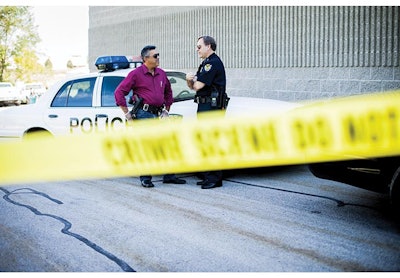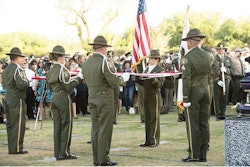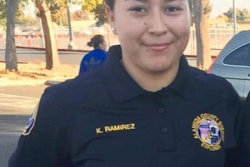 Photo: iStockphoto.com
Photo: iStockphoto.com
As first responding officers, our job consists of conducting an initial investigation that will either be cleared up on the scene by an arrest, by filing of charges afterwards, or will have to be followed up on by someone else. The follow-up is done by someone other than a first responder who is a specialized crime investigator like a property crimes detective. Conducting an investigation revolves around knowing your first responder responsibilities and knowing what the follow-up investigator (detective) will be looking for. In other words, you need to know your role in the investigation and understand that where you leave off someone else begins.
Different Responsibilities, Same Goals
Most first responding officers are in some type of road patrol unit. They go from call to call and how much time they spend on each is always an issue. Time is a luxury that first responders don't have. They have to try to answer who, what, when, where, why, and how as fast as they can. Detectives don't share the same time restraints. They can focus all of their attention on any one of the "Five W" questions. Detectives often spend days if not weeks at a time trying to put the pieces of the puzzle together in order to complete the investigation.
Take interviewing a witness, for example. Because of the nature of the job, first responding officers have to get the basic information, handle the call, and move on to the next call as quickly as possible. Detectives, on the other hand, can spend all day with a witness if they think it will help. Though the time restrictions for first responders and detectives might be different, their goals remain the same. Each one tries to do the best they can with their part in the investigation.
Of the two, I believe the first responder's role is more important because the beginning always determines the end. What any first responding officer does or fails to do will ultimately determine the outcome of the investigation. For example, if a first responding officer makes any mistake in obtaining witness information or the handling of evidence, or inadvertently violates someone's constitutional rights, the case can be lost long before it ever gets to trial.
From the Officer's Perspective
The best investigative template I have ever used involves trying to answer who, what, when, where, why, and how. If you can answer all of these questions, you have obviously solved the case and your investigation is complete. On the other hand, if you can only answer a few of these questions, then you have given a detective a great place to start.
As the initial investigator, you are responsible for answering each of these questions in some way. It's a relatively simple task as long as you remember that each question has but three possible answers. You either have the information, you don't have the information, or you don't have it now but can get it later. I'll use obtaining contact information as an example. You are speaking with a complainant and need to get their contact information. You ask for their phone number. The complainant will either give you their phone number, state they don't have a phone number, or tell you they can't remember and will have to give it to you later. In other words, it may not be the answer you are looking for, but there is an answer you can provide as part of your investigation.
If your investigation clearly states what information you have, what you could not obtain, and what needs to be done later, no one should find fault with it. It's an approach all first responding officers should take a good look at throughout their investigation. It makes the pass off to the detective as complete as possible. When you are done, there should be no doubt in anyone's mind where your investigation ends and where the detective's needs to begin.
Unless there is a good reason why you couldn't perform a necessary task or obtain some type of information, a detective should never need to go back and do it for you. For example, if you could not process a part of your crime scene due to inclement weather, you need to include that information in your report. Since it still needs to be done, make sure you include the fact that you scheduled the processing with your crime scene unit for their follow-up. In an investigation, why you didn't do something can be just as important as why you did.
Most agencies have some form of tasking sheet that detectives can use to request more information. At my former agency, when they sent one down, it usually meant you had failed to do something that you could have done during your investigation. Trying to get contact information from a tourist that has left the area or processing a car that is no longer there is never fun and teaches you a much needed lesson. Unless the detective was being unreasonable, getting a tasking sheet will generally be frowned upon by your peers, supervisor, and administrative staff. The bottom line is if you do your investigation properly, regardless of how much useful information you collect at the time, you should never get one.
From the Detective's Perspective
Most detectives understand that first responding officers don't have all day to handle one call so they are not looking for a complete case packet. What they are looking for is basic information that covers who, what, when, where, why, and how. They are also looking for officers to use all the tools at their disposal at the time of their investigation.
For example, using your agency's database to retrieve information is an important step that is sometimes overlooked. Maybe your witness forgot something but you have the information from a previous incident. Time permitting, look at the reports your suspects or persons of interest have been involved in. There is a world of information that can be learned from these, including behaviors and patterns of the individual suspect.
Communication is also important. Detectives want a working relationship with you. Stop by or call the detectives assigned to your area. Being able to exchange information and strategies are important to each of your success. Ask a detective if you can look over a copy of a complete case packet from one of their investigations. This will give you a chance to see an investigation from start to finish. It will also show you what kind of work and level of detail goes on beyond the initial report you submit as an officer.
Final Thoughts
Any investigation is broken down into two parts: initial and follow-up. Since first responding officers are responsible for beginning the process, a great deal of weight is placed on their shoulders. First responding officers should remember that it's their investigation until they pass it on. They need to do as much with it as possible before they do, and remember that the end depends on the beginning.
Amaury Murgado retired a senior lieutenant from the Osceola County (FL) Sheriff's Office with over 29 years of experience. He also retired from the Army Reserve as a master sergeant. He holds a Master of Political Science degree from the University of Central Florida.











